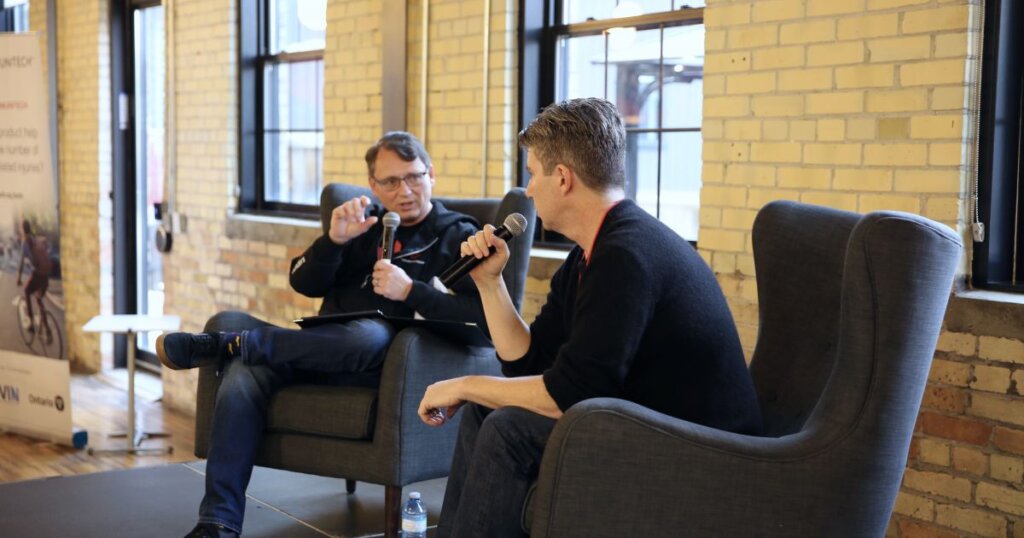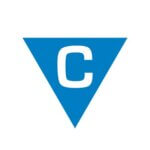Home » Navigating AI with a side of bacon
Navigating AI with a side of bacon

According to Jaron Waldman, Chief Product Officer of Cohere, generative artificial intelligence (AI) and large language models (LLMs) are the next major platform shift in computing.
“Every 15 years, major tech shifts like PCs, the internet and mobiles redefine how we live,” he told a breakfast gathering at the Communitech Hub earlier today. “Now, LLMs are set to reshape how we build and use applications, marking another pivotal change in the way technology influences our lives.”
In a fireside chat with Kevin Tuer, Chief Technology Officer of Communitech, Waldman shared insights into Cohere's journey, developments in AI and the role of responsible and ethical AI in the product development lifecycle.
After being involved in multiple acquisitions in the U.S. for 12 years, Waldman returned to Canada in 2021 and found himself developing models, particularly those related to language technologies, for Cohere.
"At Cohere, we specialize in building foundation models, large language models and both powerful generative models and specialized retrieval models,” he said. “What sets us apart from competitors is our laser focus on addressing the specific needs of enterprise companies.”
With the rise of ChatGPT in Nov. 2022, Cohere found itself at the intersection of an industry awakening, Waldman said.
“We initially focused on bleeding-edge technologists, but after the release in November 2022, we saw a rapid shift,” he added. “In 2023, our conversations transitioned from smaller developers to very large companies and technology firms.”
Waldman anticipates that 2024 will be the year when those tinkering and building prototypes will need to move their applications from development to production.
“They have to get them out in production, facing barriers, especially when building at scale for applications with tens of thousands or hundreds of thousands or millions of users,” he added. “Building a prototype is exciting, but then you have to navigate the frictions to get it into production, and that becomes the real focus."
Waldman rejected the idea of dwelling on the pessimistic outlook of AI risks and instead focused on opportunities. In particular, he highlighted the potential of AI in automating routine tasks.
"I believe there are tremendous opportunities in AI that we must focus on,” he added. “There's an incredible amount of mundane work that we engage in daily— tasks like phishing for information, inputting data into decks or checking customer statuses in SaaS applications. AI holds the potential to automate these routine tasks.”
Waldman discussed Canada's historical advantage in supporting neural network research, citing sustained funding during global downturns. He highlighted Canada's appeal for AI talent, particularly evident in Cohere's founders choosing to return to Toronto for its rich pool of expertise.
“Although there are fewer individuals experienced in scaling large companies in Canada, the increasing number of professionals returning presents an opportunity for us to contribute and navigate the challenges of scaling quickly," he said.
The breakfast event, which attracted 85 attendees from across the tech ecosystem, also included a presentation by Mardi Witzel, COO of PolyML, who talked about the company’s journey.
Founded in 2019, PolyML offers machine learning technology primarily in the areas of automotive manufacturing, health care and finance.
“Those seem like weird bedfellows, but what they share in common is the type of data,” Witzel said. “They both are prone to very large datasets that are massively featured, meaning you have many features that predict what you're trying to predict.”
Engaged in a value proposition, PolyML is collaborating with a $5 billion Canadian auto parts manufacturer, Martinrea, and has deployments in Canada and a forthcoming pilot in Mexico.
Witzel said that the company has achieved its first licensing and services revenue and is strategically targeting financial institutions due to the compatibility of their data with the technology.
“We know the technology works and we have a rock-solid technical team,” she added. “Big thanks to Communitech for supporting us over the years.”
Communitech
https://communitech.ca
"Communitech helps tech-driven companies start, grow and succeed. Communitech was founded in 1997 by a group of entrepreneurs committed to making Waterloo Region a global innovation leader. At the time it was crazy talk, but somehow this community managed to pull it off. Today, Communitech is a public-private innovation hub that supports a community of more than 1400 companies — from startups to scale-ups to large global players. Communitech helps tech companies start, grow and succeed in three distinct ways: - Communitech is a place – the center of gravity for entrepreneurs and innovators. A clubhouse for building cool shit and great companies. - Communitech delivers programs – helping companies at all stages with access to capital, customers and talent. We are here to help them grow and innovate. - Communitech partners in building a world-leading ecosystem – making sure we have all the ingredients (and the brand) to go from a small startup to a global giant."


